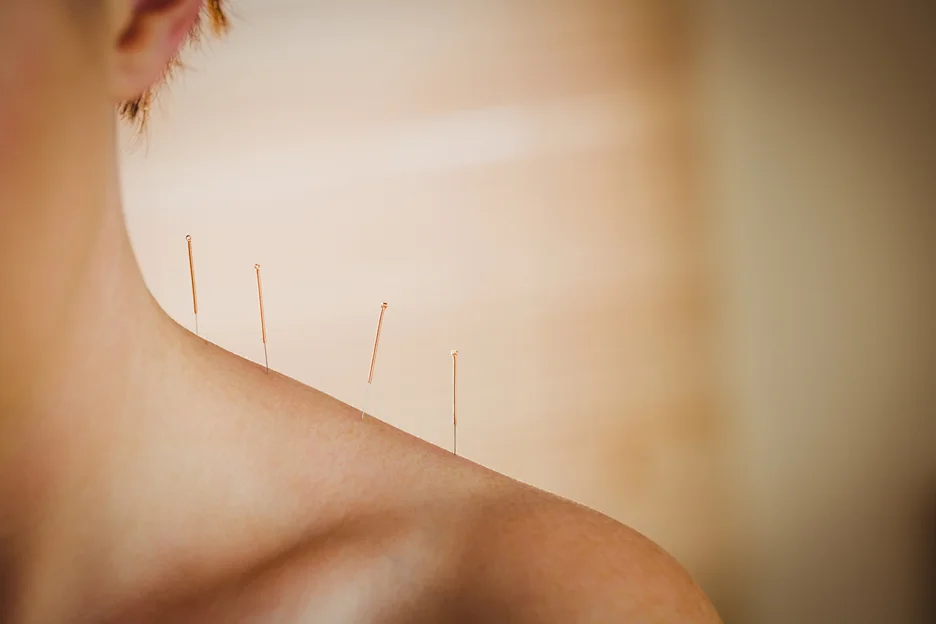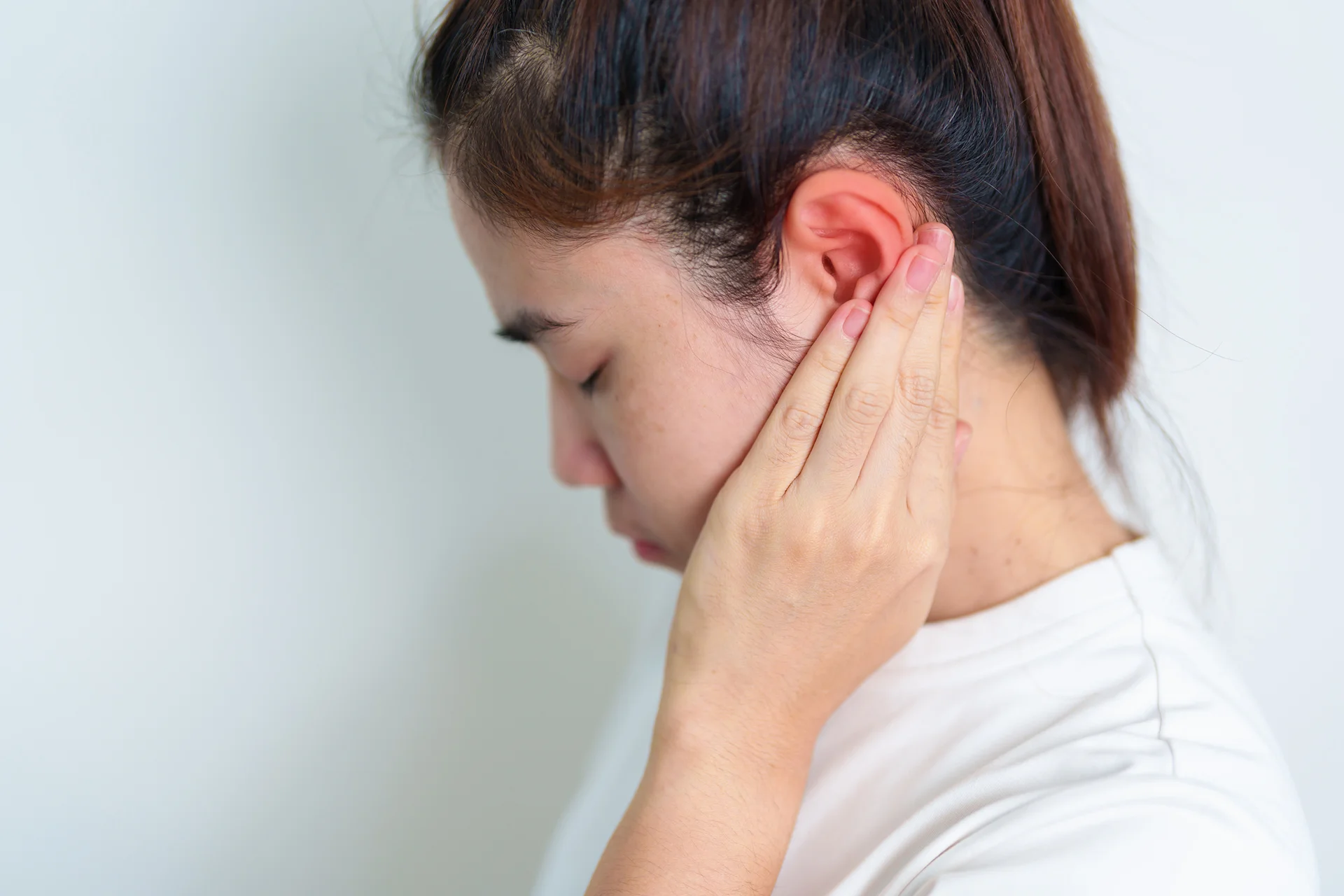Baffled by the one-two punch of ear and neck pain? While these dual symptoms can simply be caused by sleeping in an awkward position or straining your neck muscles, persistent or severe ear and neck pain can also indicate more serious underlying conditions that require professional treatment.
Let’s get to the bottom of these dual symptoms once and for all. Discover the specific sensations, triggers, and risk factors you need to watch out for, so you can catch a recurring problem early and get the right diagnosis.
Why Does My Ear Hurt Down to My Neck?
Ear pain radiating to the neck can result from ear-related issues like infections and Eustachian tube dysfunction or neck-related problems, including spine and muscle tension. Temporomandibular joint dysfunction, referred pain, neck injury, and arthritis are other potential causes.
- Injuries and Trauma – Recent injuries or trauma to the delicate structures of the neck and throat like whiplash or blunt injury can lead to sprains and strains of the muscles and ligaments around the cervical vertebrae and base of the skull. These strained neck muscles can radiate pain signals upward into the ears.
- Poor Posture – Slumping forward or having your neck bent at an awkward angle for too long can overstretch the muscles and other soft tissues of the neck. This often happens from poor posture while working on a computer or looking down at your phone too much. The resulting neck tension refers to pain in the ears.
- Arthritis – Degenerative bone and joint conditions like osteoarthritis or rheumatoid arthritis affecting the cervical spine can cause inflammation and stiffness in the neck’s vertebral joints. The swollen joints press on nerves that run up to the ears, leading to ear and neck soreness.
- Spinal Conditions – Herniated disks, bone spurs, or a misalignment in the vertebrae of the neck can pinch nerves that branch upward from the cervical spine to the ears and face. This nerve compression leads to radiating neck and ear discomfort.
- Ear Infections – Middle ear infections and swimmers’ ears caused by built-up earwax or fluid retention can make the ears ache. The outer ear shares nerves with the lower neck, causing referred pain in the neck.
- TMJ/Jaw Issues – Misalignment of the temporomandibular joint or grinding of the teeth can strain the jaw muscles and pinched nerves that run from the neck to the ears. This can generate neck pain that affects the ears.
- Sinus Problems – Blocked sinuses and sinus infections put pressure on the ears and nerves running through the neck. This can contribute to simultaneous neck achiness and ear pain.
- Stress – Chronic stress and muscle tension in the neck and shoulder region can manifest as neck soreness radiating into the ears. People prone to headaches and migraines may also experience ear and neck pain from tense neck muscles.
- Tumors – In rare cases, abnormal noncancerous growths or tumors forming in the cervical spine or arteries of the neck can press on nerves connecting the spine to the ears, causing referred neck and ear pain.
Can COVID-19 cause ear and neck pain?
While not common, COVID-19 can lead to ear and neck pain. Ear pain may result from inner ear cell damage, often emerging during days 5-8 of infection. Long-COVID may bring persistent ear pain.
Some COVID-19 cases also experience neck pain and muscle soreness, affecting up to 62.5% of individuals. For those with isolated ear or neck pain without other COVID-19 symptoms, alternative causes like ear infections or muscle strains should be considered.
Can Bell’s palsy cause ear and neck pain?
Bell’s palsy can sometimes cause ear and neck pain. Pain may manifest behind the ear or near the jaw, sometimes preceding facial weakness. This pain could result from referred signals between the facial nerve and the brainstem.
Occasionally, Bell’s palsy coincides with trigeminal neuropathy, causing facial and neck pain. While less common, ear and neck pain can be associated with Bell’s palsy, potentially due to trigeminal nerve involvement or referred sensations.
Can a toothache cause pain in the ear and neck?
Yes, a toothache can cause pain in the ear and neck. Dental issues such as infections, cavities, or abscesses can lead to radiating pain due to the close proximity of dental nerves to the ear nerves.
Is ear pain common after head and neck radiation?
Ear pain is common after radiation to the head and neck, causing symptoms like heaviness, aching, hearing loss, ringing, and dizziness. Radiation can directly damage the cochlea and ear canal, increasing the risk of problems.
Dysfunction of the Eustachian tubes and fluid buildup after radiation also lead to ear pain. The severity depends on radiation dose and treatment length.
What Are the Symptoms of Ear and Neck Pain?

- Sharp, stabbing pain in one or both ears that may be intermittent or constant
- Throbbing, pulsating ear aches on one or both sides
- Deep muscular aches and soreness in the neck and back of the head
- Stiffness and reduced mobility of the neck and difficulty turning the head
- Aching or stiffness that travels down from the neck into the shoulders and upper back
- Tenderness in the muscles around the base of the skull and top of the neck
- Shooting or radiating pain from the neck that travels up into one or both ears
- Ringing in the ears (tinnitus) or a feeling of fullness and pressure in the ears
- Dizziness and vertigo along with ear and neck pain
- Headaches accompanying the neck and ear pain, especially at the base of the skull
- Discomfort or pain in the neck and ears when chewing or speaking
- Muffled or reduced hearing in conjunction with neck soreness
- Drainage from the ears
Any combination of these sensations warrants closer examination to determine the underlying cause. Severe, persistent, or debilitating pain definitely requires prompt medical attention. Caught early, many causes of referred neck and ear pain can be readily treated.
Seeking a Medical Diagnosis
Don’t assume that ear and neck soreness will disappear in a day or two. See a doctor if:
- Neck pain lasted longer than one week with no improvement. For ear pain, do so if you feel no relief or symptoms get worse after 24 hours.
- You recently suffered injury or trauma to the head, neck, or jaw regions
- The pain interferes with sleep or your ability to work and function
- You experience hearing loss, dizziness, vertigo, or tinnitus along with neck and ear pain
- Numbness, tingling, or weakness in the neck, shoulders and arms
- You have a history of arthritis, dental issues, or spinal problems
- Pain medication and muscle relaxers provide little relief
- Your ear and neck pain is accompanied by fever, headaches, nausea, or neurological symptoms
- You have a weakened immune system or other chronic health condition
- The pain is severe and unbearable
Don’t wait it out if your symptoms are severe or persist without improvement. Seeking timely medical care leads to better outcomes and can prevent complications.
Your doctor will start with a physical exam of your head, neck, ears, throat, and jaw. Range of motion tests help assess stiffness and mobility issues. A neurological exam checks nerve function and reflexes.
Your medical history provides clues about underlying causes. Advanced imaging like CT scans and MRIs give detailed views of the cervical spine and soft neck tissues. Bloodwork helps diagnose infections, arthritis, and other illnesses.
How Can One Alleviate Ear and Neck Pain?

Diverse remedies can relieve ear and neck pain rooted in neck issues. Options include Advil for inflammation, physical therapy for mobility, surgery for structural problems, antibiotics for infections, and TMJ therapy for jaw-related tension. Massage, acupuncture, and steroids can help musculoskeletal causes.
Pain Relievers
Over-the-counter non-steroidal anti-inflammatory medications like ibuprofen (Advil) or naproxen (Aleve) can relieve muscle aches, joint pain, headaches and ear pressure associated with neck pain. Your doctor may prescribe stronger prescription NSAIDs or steroids for severe pain and inflammation.
Physical Therapy
Stretching, strength training exercises, manual therapy, and modalities like heat/ice packs can improve neck mobility and reduce muscle tension referring pain to the ears. Your physical therapist can also correct poor posture.
Surgery
If your neck pain and ear symptoms are due to a herniated disc, bone spur, or other anatomical issue in the cervical spine, your doctor may recommend surgery as treatment. Discectomy and spinal fusion procedures have good outcomes for nerve-related neck and ear pain.
Antibiotics
If a bacterial infection in the ears, throat, or sinuses is causing simultaneous neck aches and ear discomfort, antibiotics may be prescribed to clear the infection.
TMJ Treatment
Dentists can provide oral splints, bite adjustments, and physical therapy to realign the jaw and take pressure off the neck muscles and nerves linked to the ears. This improves TMJ-related neck and ear pain.
Stress Reduction
Relaxation techniques, biofeedback, massage, yoga, and lamps that simulate sunrise may help relieve anxiety and tense neck muscles contributing to referred ear pain.
Alternative Therapies
Chiropractic adjustments, spinal manipulation, acupuncture, and dry needling can realign the neck and ease muscle trigger points that radiate pain toward the ears.
Pain Injections
Steroids, anesthetics, or anti-inflammatory drugs injected into arthritic neck joints, nerves, or muscles can temporarily decrease inflammation and neck pain radiating to the ears.
With appropriate diagnosis and treatment, most cases of neck-related ear pain can be effectively managed or cured. Be sure to communicate all your symptoms to your healthcare provider and closely follow prescribed treatment plans.
What Strategies Can I Use to Reduce Ear and Neck Pain?
Do your best to improve posture, stretch and strengthen neck muscles, get massages, use proper ergonomics, avoid repetitive motions, maintain good dental alignment, manage stress, lift properly, stay hydrated, and use medications.
Improve Neck Posture
Avoid hunching your neck and shoulders while working, texting, or using electronics. Be mindful to keep your head centered over your torso. Use ergonomic pillows and office setups to maintain good posture and reduce neck strain.
Stretch and Strengthen Neck Muscles
Do chin tucks, shoulder rolls, side bends, and other stretches to improve mobility and flexibility in your neck. Build strength in your neck and upper back with exercises using resistance bands. This prevents muscle imbalances and overuse issues that can radiate pain into the ears.
Massage Tense Muscles
Have a professional massage therapist provide deep tissue massage to loosen up tight neck muscles and address trigger points that cause referred ear pain. Self-massage these areas too.
Use Proper Ergonomics
Position your computer screen, phone, and other devices so you don’t have to bend your neck down excessively. Your ears should align with your shoulders. Take frequent breaks from static postures.
Limit Repetitive Motions
Reduce activities requiring prolonged neck exertion or rotation like painting ceilings or intense cycling. Vary your movements throughout the day to avoid overusing specific neck muscles.
Maintain Optimal Dental/Jaw Alignment
See your dentist regularly to adjust any bite issues, replace worn teeth, or address TMJ problems that could strain your jaw and neck muscles leading to referred ear pain.
Manage Stress
Make time for relaxing activities like reading, nature walks, or gardening. Tai chi, yoga, and meditation help calm the mind and reduce neck tension that can affect the ears. Get adequate sleep and don’t overschedule yourself.
Avoid Improper Lifting
Use proper form when lifting heavy objects by bending at the knees first and keeping the load close to your body. Holding objects too far away creates neck strain that radiates upward into the ears.
Stay Hydrated
Drink plenty of water and replenish electrolytes to prevent muscle cramping and spasms in your neck that generate ear pain. Magnesium, potassium and calcium supplements also help.
Use Medications Wisely
Limit overusing OTC pain relievers, steroids, and muscle relaxers which can cause medication overuse headaches and other side effects exacerbating neck and ear pain.
Get on Top of Ear and Neck Pain with Kaly

If you’re suffering from chronic ear and neck aches or soreness that has yet to be diagnosed or resolved, the specialists on Kaly can provide advanced diagnosis and innovative treatment plans to finally treat the root causes of your pain.
Kaly’s advanced algorithm instantly matches patients with top local specialists for their specific condition based on real patient reviews and verified credentials. Within days, you can be on the path to long-term neck and ear pain relief.
Schedule an appointment with a top orthopedic spine specialist or physiatrist on Kaly today to determine the cause of your debilitating neck and ear pain. Customize your search for providers who accept your insurance and focus on personalized, holistic pain relief treatments.
Regain your quality of life and comfort. Get matched with your perfect specialist now!
FAQs
What’s the connection between ear vertigo and neck pain?
Cervical vertigo causes dizziness and links ear vertigo to neck pain months after neck injury. Disturbed communication between balance and position sensing may be the cause. Neck arthritis, poor posture, atherosclerosis, and disk issues also trigger cervicogenic dizziness with varied symptoms.
Why do I experience pain in my ear and neck when coughing?
Upper respiratory infections cause earaches from eardrum inflammation and neck pain from coughing. Sinus infections or eustachian tube dysfunction can also trap fluid, pressurizing the eardrum. Cervical instability strains nerves, radiating pain when coughing.
Why do I feel pain in my neck and ear when bending over?
Sinus infections, especially in the sphenoid cavity, can cause neck pain and ear pain when bending over due to increased fluid pressure. Eustachian tube dysfunction leading to fluid buildup in the ears can also worsen with bending over. Cervical spine instability may play a role too.
What causes pain behind my ear and down my neck when swallowing?
Ear infections, throat infections, dental abscesses, TMJ, Eagle syndrome, ear damage, reflux, and tonsillitis can all cause ear and neck pain when swallowing.
Why do I have neck and ear pain after hitting my head?
A concussion from head injury can cause delayed symptoms like neck pain and ear ringing. Physical neck trauma like strains or nerve damage during the incident can also lead to neck and ear pain. See a doctor to check for concussion or other traumatic brain injury and treat any neck injuries.
